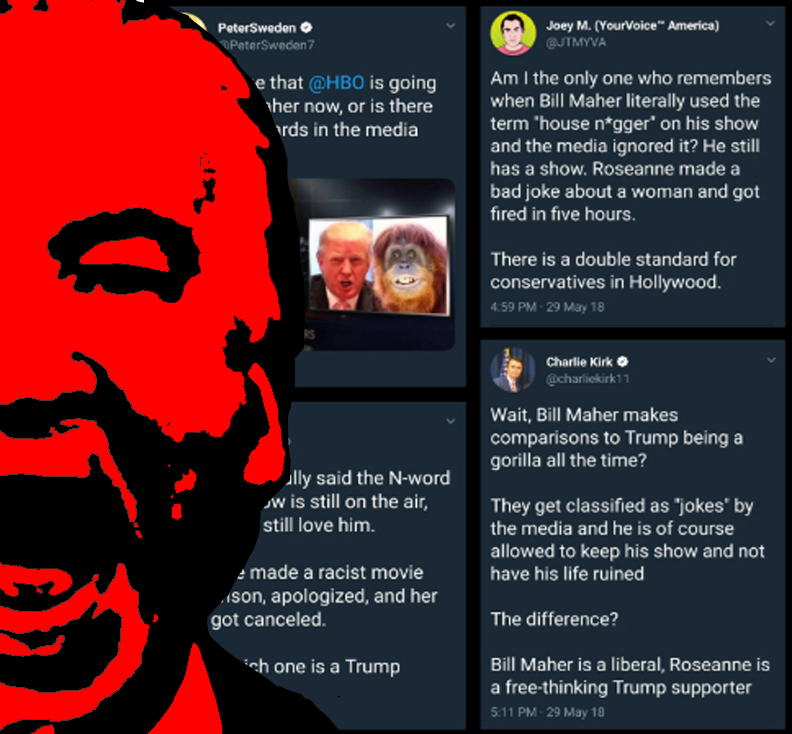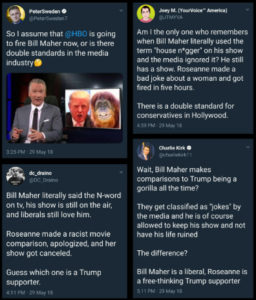
The Roseanne Barr drama is going further and further in the rearview, and with it, so are the failed attempts by conservatives to use that controversy to silence critics of Trump, a regular sport for them to be sure. But the initial attempt to zero in on Bill Maher…yeah that was dumb. Then again, did it really matter to them?
Noah Platt-Forman
It was quite amusing watching Daryle Lamont Jenkins counter-trolling cynical far right exhortations to fire Bill Maher. Maher, an ostensible liberal who is ill reputed for using the N-word on his talk show, still has his talk show while Rosanne Barr, a Trump supporter who called Obama advisor Valerie Jarret the baby of the Muslim Brotherhood and Planet of the Apes on her Twitter account, was fired.
 Although none of these characters have ever bemoaned either the existence of the perennially Islamophobic and transphobic Bill Maher nor the public use of the N-Word, suddenly they appear deeply concerned about both. Or are they? Though the context may be unique, this mode of rhetoric has been a mainstay in far right public relations in the post-Civil Rights era.
Although none of these characters have ever bemoaned either the existence of the perennially Islamophobic and transphobic Bill Maher nor the public use of the N-Word, suddenly they appear deeply concerned about both. Or are they? Though the context may be unique, this mode of rhetoric has been a mainstay in far right public relations in the post-Civil Rights era.
This rhetorical strategy, known to scholars as equivalence and reversal, is a two-step process of simultaneously validating far right positions while invalidating those outside of them. One such scholar studying this phenomenon is Mitch Berbrier, whose 1998 article in the journal Social Problems accounted the use of this strategy by David Duke, Thomas Robb, and Wilmot Robertson, among others.
What Berbrier noted in an interview with Idavox is that this is not merely an incidental childish means of argumentation, but rather, “a specific strategic and tactical package for collective action” that emerged on the far right around the late 80’s.
“More specifically,” Berbrier said, “I see [equivalence and reversal] as a developing reaction to the successes of the Civil Rights Movement, and more so the closely-related stigmatization of the KKK and of traditional white racism in general.”
Perhaps the most cynical example of this strategy was David Duke’s attempt to establish a NAAWP to rival the NAACP. The strategy works on two levels. On one level, it legitimizes exclusionary white power organizing on the basis of Black organizing for social inclusion through a false equivalence. On another level, to reject the equivalence without appeal to historical contingency is to embrace the inegalitarianism of Duke and his fellow travelers.
“The idea was to change the fortunes of white supremacists by dealing with and removing the stigma of it,” Berbrier notes of this shift in the white power movement. “Importantly (and maybe too obviously) the social and historical context and the social history and current structure of ‘race’ in America has to be kept out of the discussion.”
Berbrier continued, “The fact is that misleading claims are far more effective if you focus on engaging in angry discussion of isolated examples presented as if they occur in a vacuum, and ignore the bigger picture.”
What the Bill Maher move accomplishes is an attempted win-win. Either Roseanne gets her show back and racism is vindicated (or allusions to gorillas as the disingenuously naive Charlie Kirk suggests) or Bill Maher is fired and liberals suffer a loss. Only problem is, Maher being fired isn’t really that big of a loss.


More Stories
A Change in Tactics?
Injustice Should NOT Begat Injustice!
The Need For Teamwork